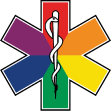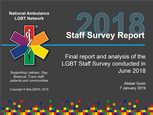2023 LGBT+ Staff Survey
Calling all LGBT+ staff and volunteers working in our NHS ambulance services. Our online survey is now live and we would encourage you to take part in this important survey which takes no longer than ten minutes to complete. The aim of the survey is to understand what it is like to work in one of our ambulance services if you identify as LGBT+.
Click here to go to the online survey.
2018 LGBT+ Staff Survey
The first LGBT+ staff suvey was conducted in June 2018 by the National Ambulance LGBT+ Network. A total of 443 respondents took part and included representatives of every NHS Ambulance Trust. Social media was used to promote the survey in addition to the individual efforts of LGBT+ Networks within each Trust. The results provide a valuable insight into life as an LGBT+ person within NHS Ambulance Trusts.
Executive Summary
The key findings of the report are:
- We are confident that our survey provides an accurate reflection of the experiences of LGBT+ people who work in the Ambulance Service. 443 responses were generated.
- It is clear that bisexual and trans people have a significantly worse experience than lesbian and gay people.
- Almost half of LGBT+ people reported experiencing ‘negative behaviours’ because of their sexual orientation or gender identity.
- Most of these behaviours were initiated by patients and colleagues and took the form of comments, name calling and banter. Incidences of physical violence are very rare.
- Although the majority of people are aware of support mechanisms and staff networks, less than half the respondents reported being able to get support from their management teams.
- The survey found little difference in the experiences of operational and non-operational staff.
- Almost two thirds of lesbian and gay respondents felt able to be ‘out’ at work. This figure reduces significantly for trans people and even more for bisexual colleagues.
- Awareness of the existence of staff networks is good but many people reported not knowing what their function was and have difficulty getting to events.
- It is clear staff networks need to do more to promote their purpose to the workforce and learn from experiences to make them more inviting for people to attend.
- Despite other factors 95% of LGBT+ people report feeling safe working for the Ambulance Services. 81% would recommend the service as an employer to family and friends.
- There were a large number of suggestions as to how Trusts can make the lives of LGBT people better. This includes better awareness raising of the issues for LGBT+ people, better advice to managers dealing with LGBT+ issues and a ‘zero tolerance’ approach to negative behaviours from the public.


